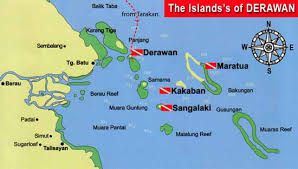Kakaban island is part of the Derawan Islands, East Kalimantan, Indonesia.
The island has an area of 774,2 ha and is quite steep with limestone cliffs covered with dense jungle right down to the water's edge and few beaches. The wall drops to 180 m and currents can be strong with upwelling, downcurrent and reversing directions.
This place is similar to jellyfish-lake in Palau, Micronesia.
 |  |  |
The most distinctive feature is the huge brackish water lake in the middle of the island, in the local dialect Kakaban means "hug" as the island hugs the lake from the surrounding seawater.
Jellyfish Lake
In the middle of this island is a mangrove fringed lake, slightly above sea level, where thousands of non-stinging jellyfish live making it interesting for diving. The jellyfish consist of four different species which have lost their natural defense system because of the lack of major predators in the lake.
The lake has warm brackish water and the bottom is covered with marine green algae. There are other animals living here, some sea cucumbers, gobies, anemones, tunicates, crustaceans, nudibranchs, orange purple clams and yellow clams on the branches and snakes.
The lake is at most 17m deep with poor visibility and is 10 minutes walk from the beach. Kakaban was probably uplifted during the Holocene and sea water was trapped turning the area and formed a landlocked marine lake. The water is now a mixture of salt water and sweet water from the rain.
 |  |  |  |  |  |
Barracuda Point
This is a steep wall, where the current brings large pelagics like whitetip sharks, leopard sharks, jack, tuna, barracuda, snapper, trevally and of course a large school of barracuda. You can do a drift dive but a grab line has been permanently secured at 24 m across a relatively flat area on the upcurrent side of the point. Currents can be fierce with down currents.
Blue Light Cave
The cave starts at a hole on the top of the wall (2 m deep) and descends through a narrow chimney. At about 21m the chimney opens into a large cavern with the bottom at 30 m, the ceiling of the cave for about 120m. When approaching the exit of the cave the blue light of the sea can be seen. The exit is a long vertical crack in the wall and about 2m wide and lies at 44 m. There is also another exit at 64 m.



No comments:
Post a Comment